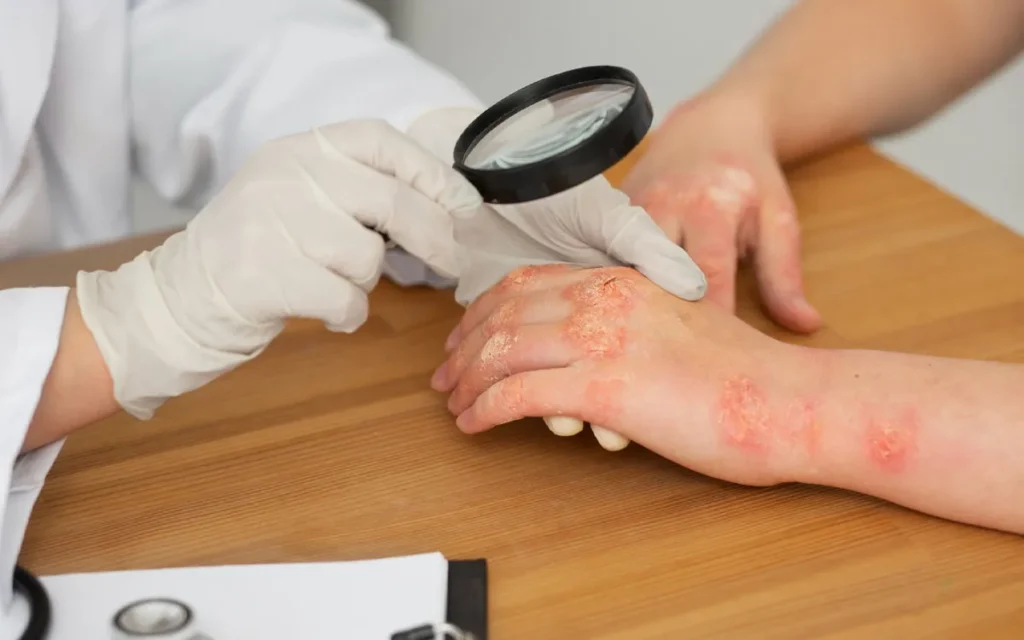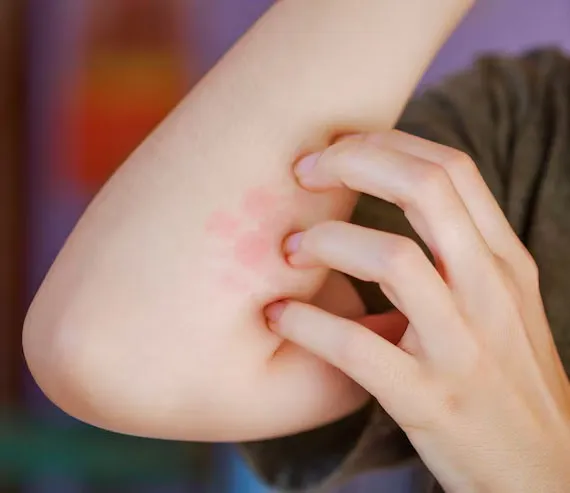
How to treat and prevent fungal infections in the skin
Table of Contents
ToggleIntroduction
Red, itchy, and irritated skin is a constant source of discomfort and distress, but most of these conditions are treatable and symptom relief can be achieved easily. Recurrent and persistent symptoms and rashes are a cause of concern and you should visit a dermatologist for further evaluation and treatment.
One of the common causes of persistent rashes is fungal infections which are a cause for concern and frequently lead to embarrassment.
What is skin fungal infection?
Skin fungal infections, commonly known as Ringworm are caused by skin-loving fungi which are commonly found in the environment. Rashes develop on the skin, more commonly in areas that are warm and moist. The possible reasons that affect the skin and cause infections are:
- Weak immune system
- Longtime antibiotics
- Diabetes
- Sweating
- Improper hygiene practices
How do fungal rashes appear on the skin?
Generally, ringworm looks like a bright red rash that spreads towards the periphery with mild scaling and has itching, irritation, or sometimes pains if rubbed.
Types of skin rashes
Here are some types of fungal infections:
- Athlete’s foot: When the skin of the feet is infected.
- Nail fungus: When a fungal infection grows under the nail.
- Jock itch: When rashes appear in the groin area, buttocks, or thighs.
- Scalp ringworm: when rashes appear on the scalp.

Why Consult a Dermatologist for Fungal Infections?
Many antifungal creams can help in treating this infections. However, it is crucial to seek professional advice and consult a dermatologist to avoid the risk of worsening the infection and have safe treatment.
Hale Clinics uses properly prescribed medicines from the most experienced doctors that can help treat fungal infections most effectively and speedily.
Can we treat fungal infections through home remedies?
Home remedies can help treat fungal infections, but sometimes they can make your skin health even worse to control these infections. So, it should be avoided to make sure it doesn’t worsen or spread to the other parts of the body.
How to prevent fungal infections
Fungal infections may frequently recur if adequate and correct treatment is not taken.
- Always wear clean clothes and socks.
- Don’t walk barefoot anywhere, especially in gyms and public toilets.
- Cut your nails properly, and if you have fungal infections, don’t repeat the same nail cutter or sterilize before resuing.
- Try to avoid close contact with people who have fungal infections to reduce the risk of spreading the condition.
- Avoid sharing your items like clothing, towels, footwear, comb, and soap with others.
Conclusion
Fungal infections are common and shouldn’t be ignored as persistent rashes and itching lead to discomfort and difficulties in doing daily activities. Simple and consistent hygiene practices are important to save yourself from getting infected. Lastly, consult your dermatologist regularly for the best advice for skin care and personal hygiene.
You can reach out to Hale Clinics, which is based in the Mohali Chandigarh region, for the best treatments to cure your infections. They not only help you diagnose the problem accurately but also assist in curing it in the best possible way.
FAQs
Q1: What is a fungal infection?
Ans: A fungal infection is an infection caused by a fungus, which is a type of microorganism.
Q2: Who treats fungal infections?
Ans: A dermatologist treats fungal infections.
Q3: Does a weak immune system cause fungal infections?
Ans: Yes, a weak immune system is one of the main causes of fungal infections.
Q4: Is fungal infection prone to crowded areas?
Ans. Yes, it is most likely to spread in communal areas and places with more people because direct and indirect contact happens mostly in such areas, and it is the primary cause of spreading infection.
